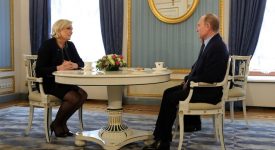Carl Hvenmark Nilsson (Center for Strategic and International Studies)
In recent weeks, several terrorist attacks have taken place on the European soil, which significantly influenced the security environment on the old continent. Europe’s top politicians are facing a difficult task. On the one hand, they must do everything possible to prevent similar disasters from happening again, while, on the other, they must resist the evergrowing voices calling for measures that do not comply with the Union’s fundamental freedoms and values. These voices will surely intensify in response to the upcoming French presidential and German federal elections, whose outcomes will be very important for the whole European Union.
The preelection debate is gradually intensifying especially in France, where the voters will choose the successor of Francois Hollande at the Elysee Palace already in the spring next year. The current French president faces strong criticism especially from the front-runners in the upcoming elections – the ex-President Nicolas Sarkozy and Marine Le Pen, leader of the far-right National Front party. Both of them, as well as other French politicians, criticize Hollande for his alleged inadequate and naive policy.
Increased tensions can also be observed on the German political scene. In response to the recent attacks, the German government has presented a nine-point plan, whose aim is to pre-vent, for example, possible radicalization of young people residing in Germany and to intensify cooperation between the armed forces. However, despite the intensified security measures, Chancellor Angela Merkel does not deviate from its policy of openness to immigrants. And it is precisely Merkel’s stance on the immigration issue, which drew more and more criticism to her, for example, from the leaders of the Eurosceptic party “Alternative for Germany“ that demon-strated in the recent regional elections its capacity to be among the main forerunners in the upcoming elections to the Bundestag.
Not only in France and Germany but also in other EU member countries, the support for Euro-sceptic, populist and often-xenophobic parties, which brings simple, populist solutions to com-plicated issues, is on rise. However, European leaders must insist on the principles, which the EU is built upon, and instead of emotional reactions, they must seek a comprehensive security strategy.
The study can be downloaded here:







